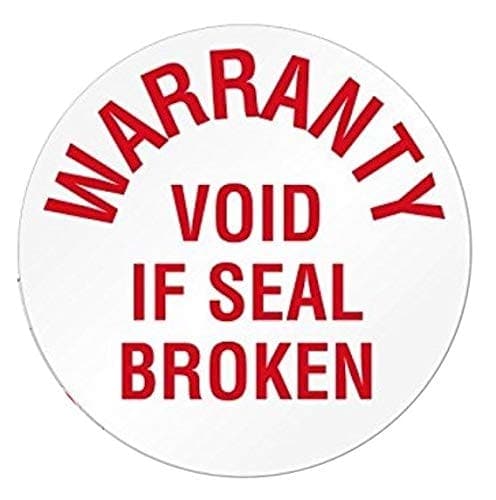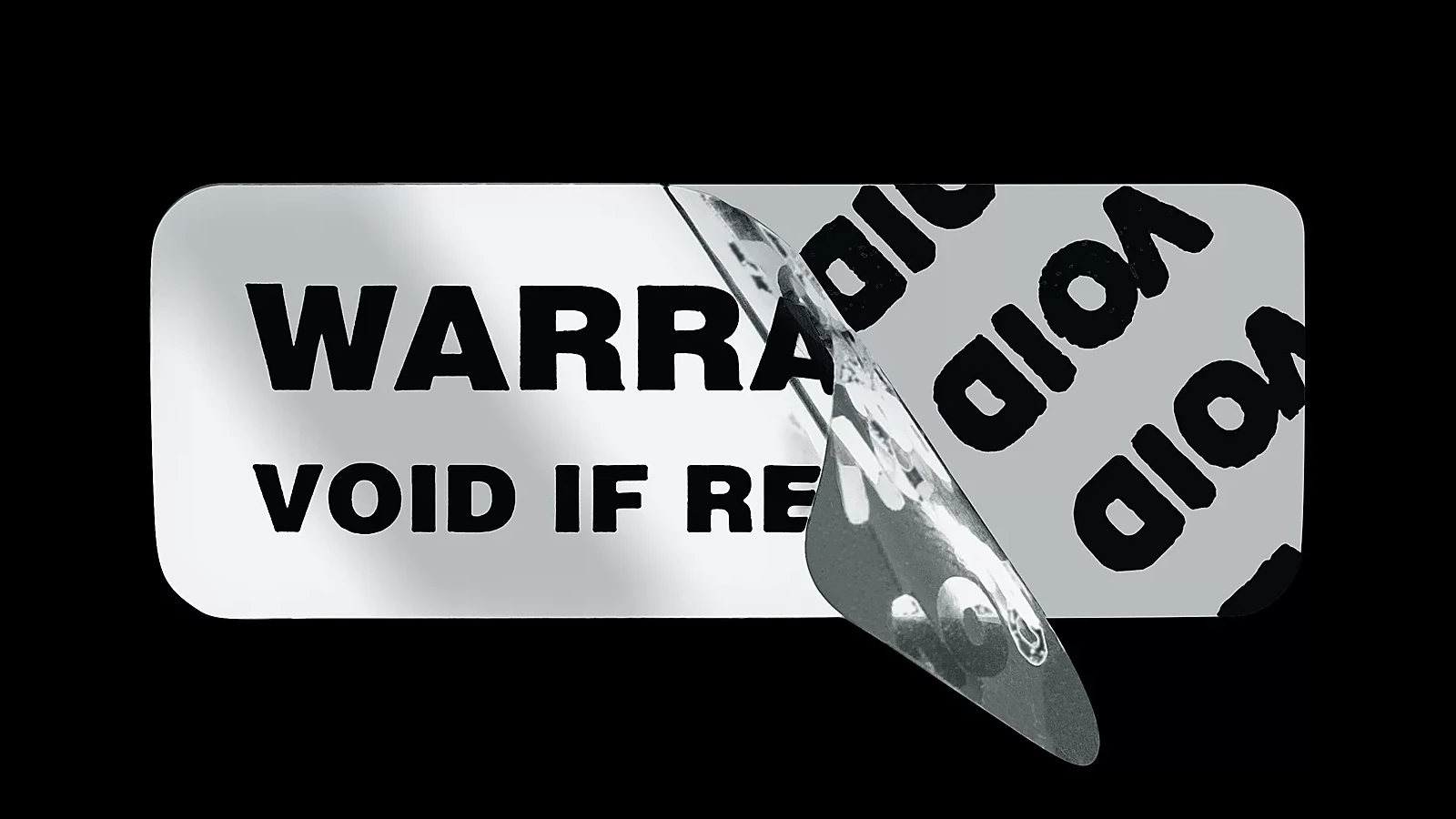Manufacturers promise that their product will work as advertised and be free of defects for a specific time. If the product doesn’t meet these standards, the warranty allows for repair, replacement, or a refund. Not all issues are covered under warranty, and certain actions or events may void the warranty. If the warranty is voided, the manufacturer is not responsible for any repairs or replacements.
This could happen by using the product in unintended ways, neglecting proper maintenance, or modifying the product in a way not approved by the manufacturer. Warranties come with specific terms that outline what is covered and what is not. By reading and complying with these terms, consumers can avoid accidentally voiding their warranty.
| What Does “Void Warranty” Mean? |
|---|
| The manufacturer or seller is no longer obligated to repair or replace your item under the original warranty agreement, even if it breaks down due to a defect. |

| # | Common Reasons Warranties Are Voided |
|---|---|
| 0 | Unauthorized Modifications: Altering the product in a way that the manufacturer didn’t intend or authorize. This includes opening it up and making internal changes. |
| 1 | Improper Use: Using the product in ways it wasn’t designed for or that are explicitly prohibited in the user manual. |
| 2 | Lack of Maintenance: Failing to perform the required maintenance as outlined in the warranty terms (e.g., not changing your car’s oil as recommended). |
| 3 | Accidental Damage: Damage caused by accidents, drops, spills, etc. Warranties usually only cover manufacturing defects, not accidental damage. |
| 4 | Tampering with Odometer (Cars): Intentionally changing the car’s odometer reading to misrepresent the true mileage. |
Important Notes:
- Specifics Vary: Always read your warranty terms carefully to understand the exact actions that can void it.
- “Denied Claim” vs. “Void Warranty”: A denied claim means a specific repair isn’t covered, but the warranty may still be valid for other issues. A voided warranty means the entire warranty is no longer in effect.
- Laws Protect Consumers: Federal laws make it difficult for companies to void warranties entirely for minor reasons.
Key Takeaways
- A warranty provides assurance that a product will work as promised and includes terms for repair or replacement.
- Warranties can be voided by misuse, lack of proper maintenance, or unauthorized modifications.
- Consumers should understand and follow the warranty terms to avoid voiding their coverage.
Understanding Warranty Coverage
When you buy a product, especially big purchases like cars, it comes with a promise that if something goes wrong under certain conditions, it’ll be fixed at no extra cost to you. Let’s get to grips with the details of warranty coverage.
Types of Warranties
Warranties come in different shapes and sizes. A manufacturer’s warranty is often included with the purchase of a new car and covers defects or issues that arise from the manufacturing process for a set period, like three years or 36,000 miles. Extended warranties, or service contracts, are optional and can extend coverage beyond the original terms. These can range from a powertrain warranty, which covers the engine and transmission, to a tire warranty that may address issues with your vehicle’s tires.
What Voids a Warranty
Certain actions can void warranty coverage. Manufacturers set out specific exclusions in the warranty terms, and failing to adhere to these can result in a partial or complete warranty void. Examples include aftermarket modifications that weren’t approved by the manufacturer, or if the car has been used in a manner it wasn’t intended for. If there’s evidence of neglect or failure to follow the recommended maintenance schedule, a warranty claim can also be denied. Be mindful that federal laws like the Magnuson-Moss Warranty Act protect consumers, ensuring warranty conditions are fair and legally compliant.
The Impact of Maintenance on Warranties
Regular maintenance is not just good for your car; it establishes a track record with the warranty provider that you’ve taken care of the vehicle. Keeping accurate service records proves that scheduled maintenance is performed and can help in making a successful warranty claim. If you don’t keep up with your vehicle’s maintenance, the insurance company might argue that the condition stems from wear and tear rather than a covered defect. It’s important to maintain your vehicle according to the warranty terms to ensure coverage remains in effect throughout the warranty period.
Complying with Warranty Terms
Staying on top of warranty terms is crucial to ensure your vehicle remains eligible for coverage. Following specific guidelines provided by manufacturers can save you from voided coverage and unexpected costs.
Authorized Servicing and Repairs
To keep a warranty valid, it’s essential to have your vehicle serviced and repaired at authorized dealerships or service centers. They know your vehicle best and use parts that meet the manufacturer’s specifications. Using aftermarket parts or modifying your vehicle with components like a cold air intake can lead to a voided warranty if they cause damage. Always check with your dealer before making changes to your car.
- Adhere to Authorized Centers: For repairs, only go to approved places.
- OEM Parts: Use Original Equipment Manufacturer (OEM) parts for replacements.
Documenting Proper Vehicle Care
Your vehicle’s warranty stays intact when you can show consistent and correct care. Adhering to the maintenance schedule laid out in your service manual and keeping detailed service records help prove you have not neglected your vehicle.
- Regular Maintenance: Follow the manufacturer’s guidelines for routine maintenance, including oil changes, filter replacements, and tire rotations.
- Record Keeping: Keep all receipts and service documents to verify proper care.
Proper fluid use, avoiding overloading the vehicle, and preventative actions against environmental harm also contribute to maintaining your warranty. The avoidance of misuse such as racing or reckless driving is equally vital. Keep your odometer accurate; odometer fraud is a serious offense and will instantly void the warranty.
Remember, the compliance with these terms doesn’t just keep your warranty safe; it ensures your vehicle runs smoothly for years to come. Regular check-ups and immediate attention to any unusual wear or noise can prevent larger issues down the road.
Frequently Asked Questions
When it comes to understanding car warranties, people often have numerous questions about what actions may lead to a warranty being voided. This section covers some of the most common inquiries car owners may have.
What actions can lead to a car warranty being voided?
Altering the vehicle’s odometer or obtaining a salvage title can void a car warranty completely. Engaging in unauthorized modifications or using the vehicle in a manner not intended by the manufacturer, like racing, can also void the warranty.
How can I determine if something I do will void my car warranty?
Review your warranty documents thoroughly. They detail what practices and situations can void your warranty. If you’re unsure, contacting the warranty provider directly is a wise move to confirm whether a specific action may affect your warranty coverage.
What are the implications of a ‘Warranty void if removed’ sticker?
These stickers are commonly placed on electronic parts of a vehicle and indicate that if the sticker is tampered with or removed, the warranty on that part can be voided. It’s a warning not to interfere with the part, as this could suggest unauthorized repair attempts.
Can neglecting vehicle maintenance result in a voided warranty?
Yes, neglect of routine vehicle maintenance can lead to a warranty being voided. Car manufacturers expect owners to follow the maintenance schedule specified in the owner’s manual to keep the warranty intact.
Are there specific conditions under which a car manufacturer can void the warranty?
Car manufacturers may void the warranty if the vehicle is used in ways not intended by the maker, suffers storm damage, or incurs damage due to misuse. These and other specific conditions are outlined in the warranty document provided by the manufacturer.
If I modify my vehicle, will it automatically void the warranty?
Not necessarily. Vehicle modifications can affect the warranty if they cause damage to the vehicle or affect its performance. However, not all aftermarket parts or modifications will void a warranty by default. It’s recommended to consult with the manufacturer or read the warranty terms to understand how modifications may impact warranty coverage.







